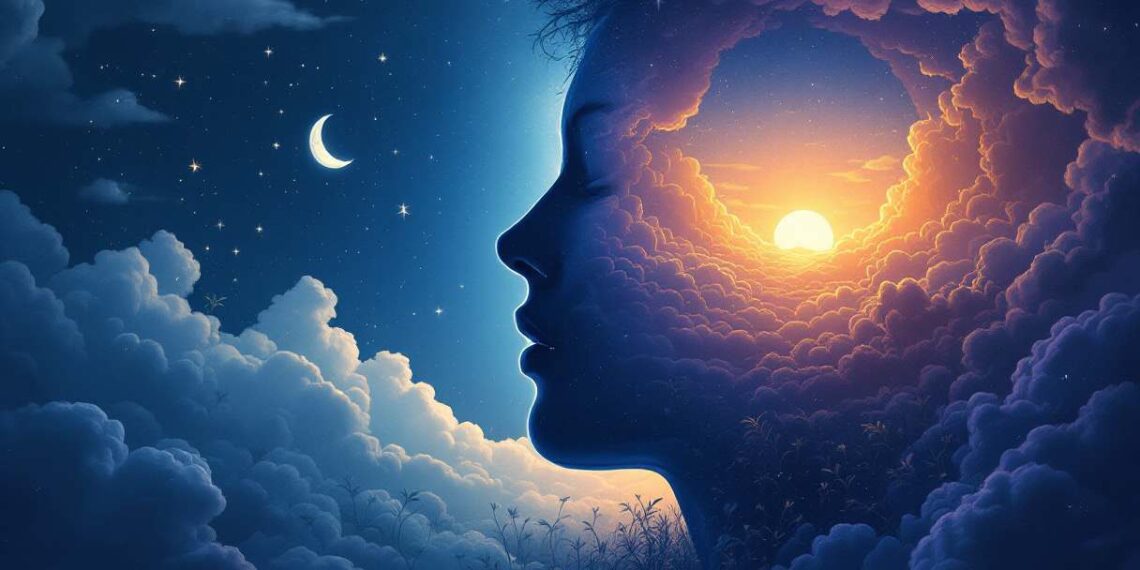Imagine your mind and body caught in a vicious cycle where sleepless nights feed into dark days, and troubled thoughts keep you tossing and turning. You’re not alone – up to 80% of people with depression experience sleep problems, while insomnia sufferers are ten times more likely to develop depression.
In this comprehensive guide, we’ll unravel the complex relationship between depression and insomnia, offering evidence-based solutions to break free from this exhausting cycle. Whether you’re lying awake at 3 AM or struggling to find joy in your day, understanding how these conditions intertwine is your first step toward reclaiming your mental peace and restful sleep.
Understanding Depression and Insomnia
What is Depression?
Depression’s like that uninvited guest who just won’t leave. It’s not like feeling blue because your team lost the game – it’s more like a storm cloud that lingers, affecting thoughts, feelings, and everything in between. People dealing with depression often feel like they’ve lost their mojo. Things that used to spark joy now look like chores. Imagine trying to run a marathon with a stone in your shoe – that’s what daily life can feel like. Symptoms show up differently for each person, but fatigue, erratic sleep, and fuzzy focus tend to stick around like gum under a shoe.
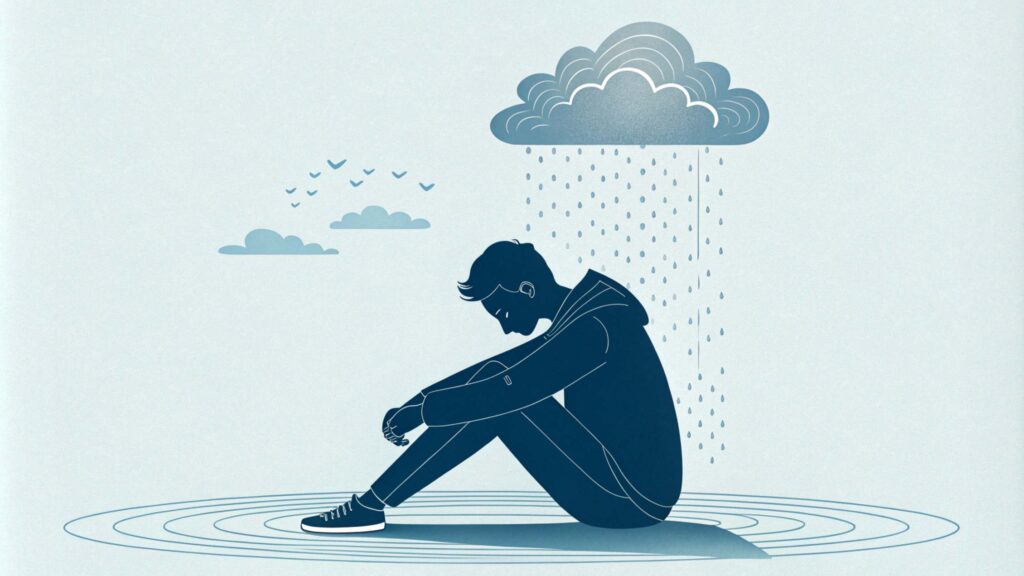
Here’s a quick look at some symptoms:
| Symptom | Description |
|---|---|
| Persistent Sadness | Feeling low or hopeless, as if there’s no light on. |
| Loss of Interest | Things you loved? Meh, not anymore. |
| Fatigue | Like your battery’s always running on empty. |
| Changes in Sleep Patterns | Can’t sleep, or can’t wake up – no happy medium. |
| Changes in Appetite | Eating habits like a rollercoaster – up then down. |
| Difficulty Concentrating | Focusing feels like chasing a chicken. |
Need more scoop on sleep and mental health? Check out our piece on insomnia vs anxiety.
What is Insomnia?
Think of insomnia as that frustrating game of hide-and-seek with sleep, except sleep’s really good at hiding. It’s more than just counting sheep until sunrise – it’s a real sleep disorder that can turn your nights into a marathon of tossing and turning. Whether it’s trouble falling asleep, staying asleep, or waking up way too early with your mind already racing, insomnia can wear you down faster than a smartphone battery running YouTube.
I notice that the “What is Insomnia?” section is incomplete in the article. Let me create a comprehensive section that aligns with the article’s style and flow:
Think of insomnia as that frustrating game of hide-and-seek with sleep, except sleep’s really good at hiding. It’s more than just counting sheep until sunrise – it’s a real sleep disorder that can turn your nights into a marathon of tossing and turning. Whether it’s trouble falling asleep, staying asleep, or waking up way too early with your mind already racing, insomnia can wear you down faster than a smartphone battery running YouTube.
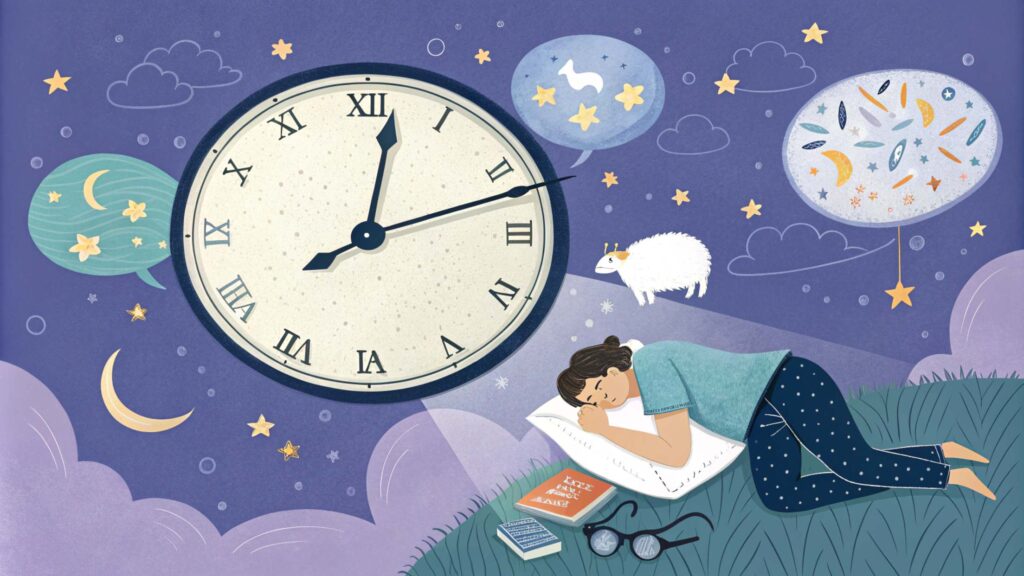
Types of Insomnia:
| Type | Description |
|---|---|
| Acute Insomnia | Brief sleep troubles (a few days to weeks), often triggered by stress or life changes |
| Chronic Insomnia | Long-term sleep disruption (3+ nights weekly for 3+ months) |
| Onset Insomnia | The “can’t fall asleep” club |
| Maintenance Insomnia | The “can’t stay asleep” struggle |
| Early Morning Awakening | When your body thinks 3 AM is a reasonable time to start the day |
Common Signs You’re Dealing with Insomnia:
| Sign | How It Shows Up |
|---|---|
| Trouble Sleeping | Fighting to fall or stay asleep |
| Daytime Fatigue | Feeling like you’re running on empty |
| Mood Changes | Irritability becomes your default setting |
| Poor Concentration | Brain fog that coffee just can’t fix |
| Physical Symptoms | Headaches, tension, and digestive issues |
| Sleep Anxiety | Worrying about sleep makes it harder to sleep |
The Impact Goes Beyond Bedtime:
| Area Affected | What You Might Notice |
|---|---|
| Work Performance | Missing deadlines or making mistakes |
| Relationships | Less patience with loved ones |
| Physical Health | Weakened immune system and increased health risks |
| Mental Sharpness | Memory and decision-making take a hit |
| Energy Levels | Everything feels like it requires extra effort |
What Triggers Insomnia:
| Trigger Category | Examples |
|---|---|
| Mental Health | Anxiety, depression, stress |
| Physical Health | Pain, hormone changes, medications |
| Lifestyle | Irregular sleep schedule, too much screen time |
| Environment | Noise, light, uncomfortable temperature |
Looking for more details about what keeps you up at night? Our article on why can’t I fall asleep might shed some light. And if you’re wondering how long this sleep struggle might last, check out how long insomnia lasts for some peace of mind.
Remember, while occasional sleep troubles are normal, chronic insomnia isn’t something you should just “put up with.” It’s as real as any other health condition and deserves proper attention and treatment.”

The Connection Between Depression and Insomnia
Getting a grip on how depression and insomnia feed off each other is crucial for folks tackling both. These two often hang out together, creating a messy cycle that’s tough to shake.
“Sleep and mental health are not just related, they’re practically inseparable. The better we understand one, the more we comprehend the other.” – Matthew Walker, PhD
The Two-Way Street
Depression and insomnia are like that pair of buddies who egg each other on. Trouble sleeping makes depression worse, and being down in the dumps can mess with your sleep. Studies say that if you’re battling insomnia for the long haul, depression might come knocking at your door. On the flip side, folks knee-deep in depression often find themselves wrestling with sleep problems.
| Issue | How It Messes with the Other |
|---|---|
| Feeling Low | Up’s chances of sleepless nights |
| Can’t Sleep | Cranks up the blue mood |
Depression’s Sleepless Nights
Depression can seriously wreck your sleep schedule. Falling asleep, staying asleep, or waking up too early becomes a game you can’t win, leaving sleep quality in shambles. Not getting restful sleep makes you tired, cranky, and generally frazzled. It throws you off your game for daily stuff and makes it even tougher to handle mental challenges. For a peek into the sleep struggle, check out why can’t I fall asleep.
Insomnia’s Mental Storm
On the flip side, insomnia isn’t just bad for the body—it messes with your mind too. Sleepless nights fuel anxiety, crankiness, and brain fog, making it hard to focus. The constant battle with sleep can tank your mood, stress you out, and hit your self-esteem, sometimes dragging you deeper into depression. Curious about how these connections play out? Dive into insomnia vs anxiety.
In essence, the dance between depression and insomnia is tricky. Spotting this loop can pave the way for finding the right help and tricks to handle sleep and headspace better. Mixing treatment options with lifestyle tweaks might just be the ticket to busting this cycle. Check out our articles on sleep restriction therapy and exercise for insomnia for some handy tips.
Factors Contributing to Depression-Insomnia Link
Piecing together the depression and insomnia puzzle means looking at what makes the two clique. They play out in three main arenas: biological, psychological, and how one styles their life.
Biological Factors
Depression and insomnia share a not-so-secret culprit: the body’s wiring. They’re pals thanks to the mix-up in hormones and brain cocktails. The big shots like serotonin, dopamine, and norepinephrine keep the mood and sleep train on track. Mess with these, and you’ve got a one-way ticket to the land of blues and sleepless nights.
| Factor | Description |
|---|---|
| Serotonin | Not just any neurotransmitter, it’s the mood and sleep maestro. Short supply means grumpy and wide awake. |
| Cortisol | Our good old stress buddy. Too pumped up and it plays hammie with your dreams and mood. |
| Circadian Rhythms | Think of this as your body’s clock. Throw it off, and you’re browsing dream central and sad-ville simultaneously. |
Psychological Factors
The mind’s no bystander to the insomnia-depression drama. It does its bit, often morphing stress and worry into either sleep’s worst enemy or a heavy heart’s best friend. It’s all in the mental games playing out.
| Factor | Description |
|---|---|
| Anxiety | When worry becomes your shadow, sleep bids farewell. |
| Cognitive Distortions | The mind’s tricky ways of turning thoughts dark; fuels sadness, sparks sleeplessness. |
| Stress | Ongoing pressure burdens the mind, makes sleep a rare visitor, and brings in the blues. |
Lifestyle Factors
The way one lives can fan the flames of these twin troubles. Be it erratic bedtime habits, no sweat sessions, or what’s on the plate—it all toggles between dreams and mild misery.
| Factor | Description |
|---|---|
| Poor Sleep Hygiene | Sporadic sleep schedules or chaotic sleep nooks—perfect recipe for sleep mishaps. Peek into our sleep hygiene checklist. |
| Sedentary Lifestyle | Couch potato mode shoots up the risk for mood dips and shattered sleep. Here’s how exercise for insomnia does wonders. |
| Diet | Late-night munchies or caffeine-before-bed can be sinister. Swap for foods that help you sleep. |
By shining a light on how biology, mindset, and lifestyle play a role, we’re better equipped to tackle the insomnia-depression twosome. Up your game further with insight into insomnia—check out why can’t I fall asleep and how to break the insomnia cycle.
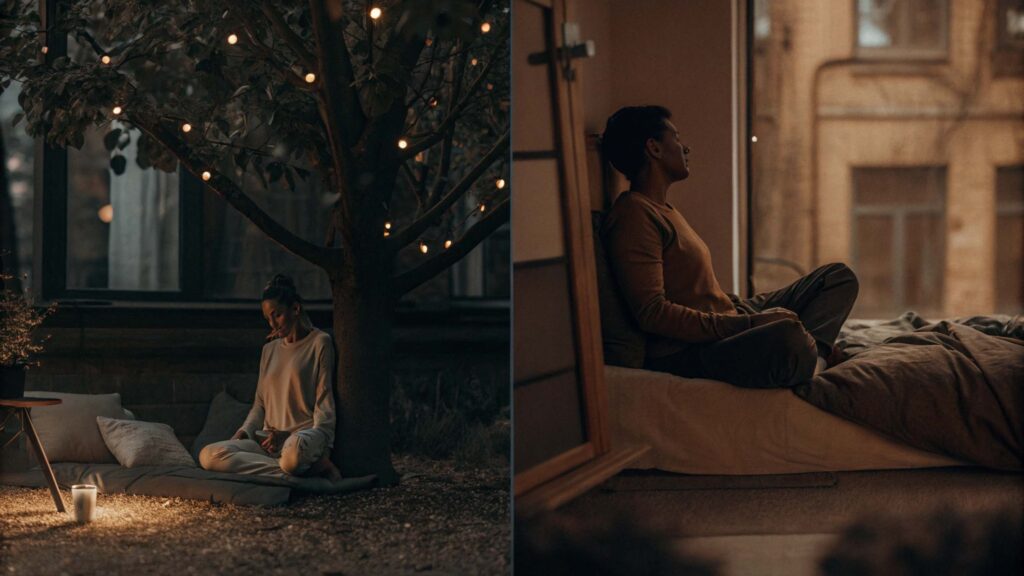
Managing Depression and Insomnia Together
Dealing with depression and insomnia can throw a wrench into your daily rhythm. Tackling both at once is like getting a twofer for your well-being.
“The best bridge between despair and hope is a good night’s sleep.” – E. Joseph Cossman
Importance of Seeking Professional Help
When depression and sleepless nights buddy up, it’s time to call in the pros. A healthcare provider can hook you up with treatments that might work better when handled together since these two love to stir the pot for each other.
There’s a whole menu of professional support out there: therapy, meds, and some nifty programs. Curious if your insomnia’s overstaying its welcome? Check out our piece on how long insomnia sticks around.
| Type of Help | Description |
|---|---|
| Therapy | Try Cognitive Behavioral Therapy (CBT) geared for insomnia to tweak those unhelpful thoughts about sleep. |
| Medication | Antidepressants and sleep meds might be on the table, but keep an eye on them with your doc. |
| Support Groups | Sharing the load with folks on the same ride can bring relief and tips. |
Treatment Approaches for Both Conditions
Different strokes for different folks! You’ve got traditional and holistic methods to ease symptoms of depression and insomnia. Here’s a little taste:
| Treatment Approach | Description |
|---|---|
| Cognitive Behavioral Therapy for Insomnia (CBT-I) | Spruces up sleep-linked thoughts and acts. Curious if it’s the real deal? Peek at the lowdown on CBT-I. |
| Medications | Some pills pull double duty on depression and insomnia but tread carefully; they come with baggage. |
| Exercise | A regular sweat session can lift spirits and help you doze off better. Hunt down exercise tips for insomnia. |
| Mindfulness and Meditation | Calming practices can chill stress levels and groove you towards relaxation. Get guided at meditation for a good night’s sleep. |
Lifestyle Changes for Better Sleep
Switch up some daily habits and watch your sleep and mood change for the better. Here’s how you can snooze your way out of the insomnia-depression loop:
| Lifestyle Change | Benefits |
|---|---|
| Establishing Sleep Hygiene | Regular sleep rituals can train your body to wind down. Check out our bedtime routine checklist. |
| Limiting Caffeine and Alcohol | Cutting down on these might mean catching better z’s. |
| Creating a Sleep-Conducive Environment | A cozy sleeping nook can work wonders for your sleep. Peek into top curtains for slumber and white noise gadgets. |
| Nutrition | Eating certain bites can help you snooze better. Our guide on sleep-friendly foods has more. |
| Morning Routine | A solid morning vibe can boost your mood and stabilize sleep. Check out AM tips for insomnia. |
Facing depression and insomnia head-on is a must for feeling better. With professional guidance, various treatment routes, and smart lifestyle tweaks, folks can find their way to better sleep and balance.
Tips for Improving Sleep with Depression
Getting a good night’s sleep is crucial for anybody dealing with depression and insomnia. There’s good news though—there are several approaches that can ease these struggles.
Sleep Hygiene Practices
Think of sleep hygiene like that morning routine you’ve perfected. It’s about those little habits and tweaks in your environment that help you drift into dreamland. Here are some easy peasy habits to get into:
| Sleep Hygiene Practice | Description |
|---|---|
| Consistent Sleep Schedule | Hit the hay and rise at the same time daily, weekends included—yes, even Sunday Funday. |
| Sleep-Optimized Environment | Keep it dark, cool, and hush-hush. Blackout curtains and a white noise machine might just be your new BFFs. Check out some options here for blackout curtains and white noise machines. |
| Limiting Screen Time | Give those screens a break at least an hour before you hit the sack—those late-night scrolls aren’t your friend. |
| Pre-Sleep Routine | Get cozy with calming activities like a good book or some gentle yoga stretches before lights out. |
These little changes can make a big difference, especially helpful for the folks thinking why can’t I fall asleep.
Cognitive Behavioral Therapy for Insomnia
Cognitive Behavioral Therapy for Insomnia (CBT-I) is a game-changer that helps folks kick those pesky sleep problems. It’s got some proven moves for both insomnia and that cloud of depression. Here’s how it breaks down:
- Sleep Restriction Therapy: Spend the right amount of time in bed based on actual sleep, slowly increasing as your sleep improves. Curious? Peek into our article on sleep restriction therapy.
- Cognitive Restructuring: Flip those negative sleep thoughts into positive vibes to reduce sleep anxiety.
- Sleep Education: Learning the ins and outs of sleep can help reshape how you see your sleep habits into something less daunting.
Lots of people swear by CBT-I—it’s backed by research, too. If you’re on the fence, read more about does CBT-I works.
Relaxation Techniques
Rolling out relaxation techniques can really soothe your mind and body, making it easier to catch those Zzz’s. Some chill ways to get started:
| Relaxation Technique | Description |
|---|---|
| Meditation for Sleep | Trying out mindfulness or guided meditation is a great way to calm the mind. Ready for zen? Check out meditation for sleep. |
| Deep Breathing Exercises | Take big, slow breaths to help melt away anxiety and tension. |
| Progressive Muscle Relaxation | Tense and release each muscle group for a full-body calm. It’s like a mini massage for yourself. |
These chill vibes not only get you snoozing but also whittle away stress. Plus, getting moving with regular exercise works wonders for your sleep, as noted in our guide to exercise for insomnia.
By trying out these tips, those wrestling with depression and insomnia might just find themselves snoozing better and feeling mentally sharper.
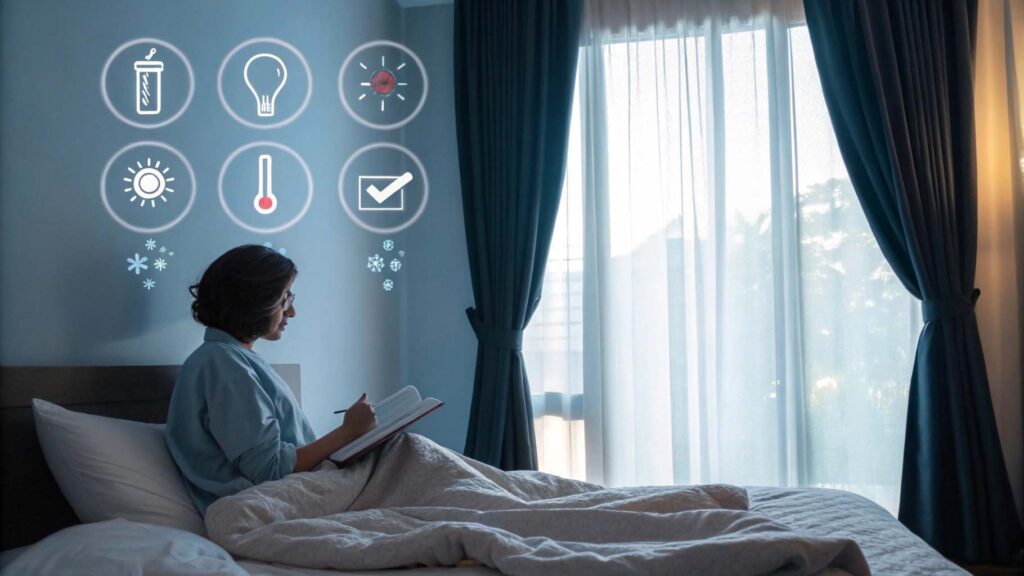
Seeking Support for Depression and Insomnia
Trying to juggle both depression and insomnia? It’s like herding cats. But fear not! Finding the right support can steer an individual toward brighter days. When you build a solid support network and dive into online resources, you’re opening the door to guidance and good vibes to tackle these frustrations head-on.
Building a Support System
Having a rock-solid support crew can make a world of difference for folks grappling with depression and insomnia. We’re talking about your dependable pals, family, or even a therapist who can dish out emotional support and some straight talk.
| Type of Support | Examples |
|---|---|
| Emotional Support | Friends, family, support groups |
| Professional Support | Therapists, counselors, medical professionals |
| Online Support | Online forums, mental health apps, community resources |
Opening up about those sleep troubles and the blues ain’t easy. But let me tell you, sharing your story can lighten the load and make you feel less alone in this mess. Jumping into a support group, whether in-person or online, means you’re mixing with others who ‘get it.’ It’s those shared nods of understanding that can be downright therapeutic.
Online Resources and Communities
The internet isn’t just for cat videos. It’s also a treasure chest of stuff for those wrangling insomnia and depression. Online communities have got your back, serving up vital info, support, and pep talks when you need ’em the most. Plenty of platforms host forums or social media hangouts centered on sleep battles and mental wellness.
Consider these online gems:
- Mental health sites brimming with stories and hacks for handling symptoms
- Forums where folks spill their secrets and survival tactics
- Apps crafted to help with tracking sleep and embracing mindfulness
If insomnia keeps crashing your party, it could be worth unpicking what’s behind it. Check out topics like insomnia vs anxiety or how pregnancy messes with your sleep. Also, peek at goodies like foods that help you sleep or exercise for insomnia to arm yourself with tools to snooze better.
By leveraging these resources, you’re not just surviving; you’re thriving. With a backup crew and online allies, you’ve got the power and the plan to shake off the shackles of sleep and mood woes. You’re not alone, and you’ve got this!
Conclusion
Breaking free from the grip of depression and insomnia isn’t just about finding the right medication or perfecting your sleep routine – it’s about understanding how these conditions influence each other and taking a comprehensive approach to healing. By combining professional help with lifestyle changes, building a strong support system, and implementing evidence-backed strategies, you can gradually untangle these intertwined challenges. Remember, progress isn’t always linear, but every small step toward better sleep and improved mood is a victory worth celebrating. You don’t have to navigate this journey alone – reach out, stay persistent, and trust that better days (and nights) are ahead
Frequently Asked Questions
Which comes first – depression or insomnia?
It can work both ways. While insomnia is often an early symptom of depression, chronic sleep problems can also increase the risk of developing depression. This creates a bidirectional relationship that can be challenging to untangle.
Can treating one condition help with the other?
Yes! Treating either condition often leads to improvements in both. For example, cognitive behavioral therapy for insomnia (CBT-I) can help reduce both sleep problems and depressive symptoms.
How long does it take to see improvements when treating both conditions?
Timeline varies, but most people start seeing improvements within 4-6 weeks of consistent treatment. However, full recovery may take several months and requires ongoing maintenance.
Are medications the only solution?
No. While medications can be helpful, a combination of therapy, lifestyle changes, and good sleep hygiene often provides the most effective long-term solution.
Can natural remedies help with both depression and insomnia?
Yes, certain natural approaches like regular exercise, meditation, and maintaining a consistent sleep schedule can help manage both conditions. However, these should be used alongside professional treatment rather than as replacements.
How can I tell if my insomnia is related to depression?
If your sleep problems are accompanied by persistent sadness, loss of interest in activities, changes in appetite, and difficulty concentrating for two weeks or more, they may be related to depression. A mental health professional can provide a proper diagnosis.
Resources
- National Institute of Mental Health – Depression:
https://www.nimh.nih.gov/health/topics/depression - Sleep Foundation – Insomnia and Depression:
https://www.sleepfoundation.org/mental-health/depression-and-sleep - American Psychological Association – Sleep and Mental Health:
https://www.apa.org/topics/sleep/why - National Alliance on Mental Illness:
https://www.nami.org/About-Mental-Illness/Common-with-Mental-Illness/Sleep-Disorders

